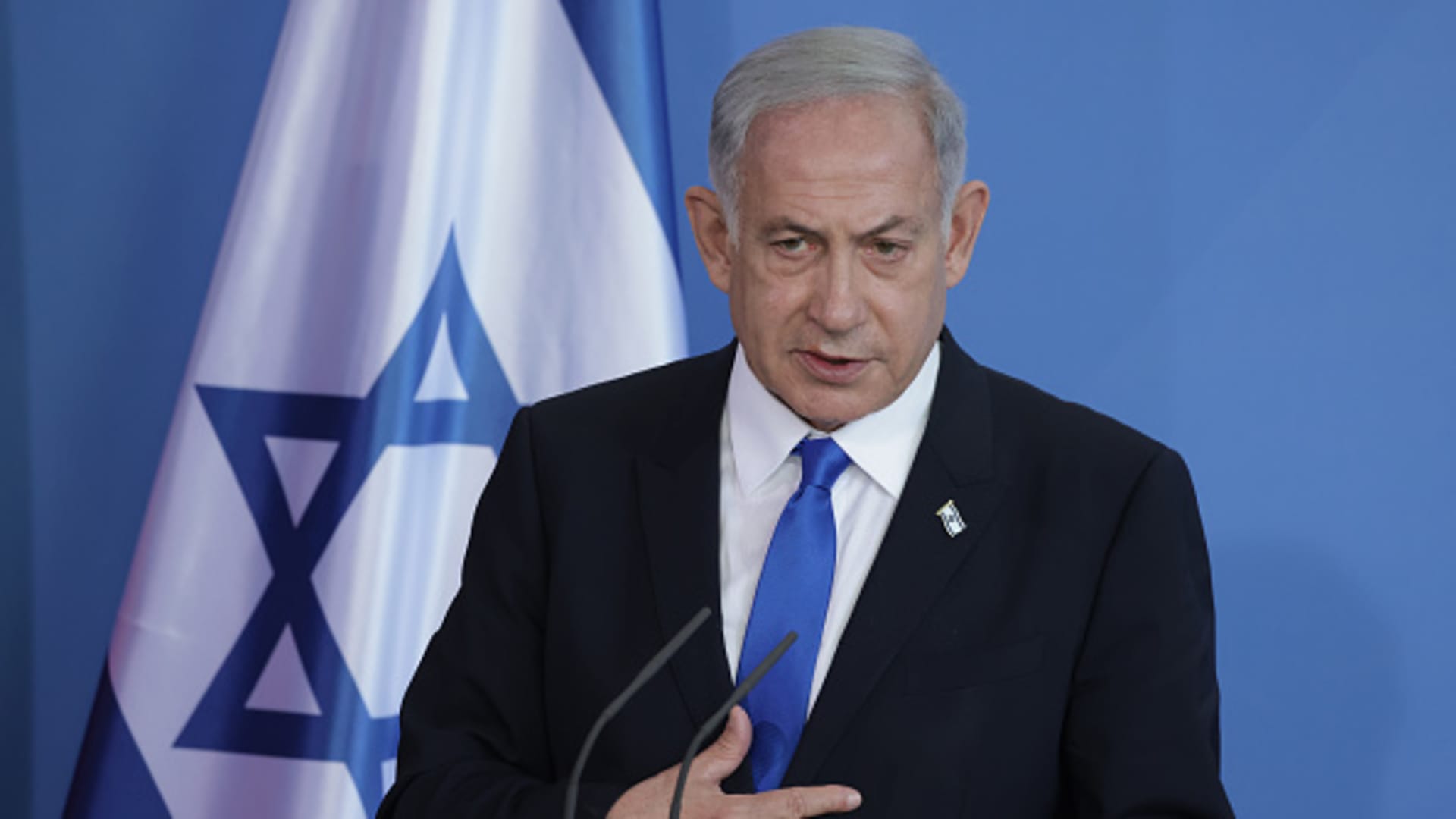Israeli Prime Minister Benjamin Netanyahu signaled concerns in an interview published Thursday that Israeli-manufactured defense systems, including the U.S.-funded Iron Dome, could reach Iran if they were transferred to Ukraine.
In a video interview with the Wall Street Journal, Netanyahu hinted that, if systems used by Ukrainian forces were to fall into Russian hands, the country’s tight relationship with fellow U.S.-sanctioned nation Iran could see them end up under Tehran’s control. He did not specify exactly how Iran would obtain this equipment.
Moscow has used Iranian-made Shahed drones in the war in Ukraine, rebranded as Geran. Tehran has in the past said it did not supply these weapons to Russia for use against Kyiv.
“We’re concerned also with the possibility that systems that we would give to Ukraine would fall into Iranian hands and could be reverse engineered, and we would find ourselves facing Israeli systems used against Israel,” Netanyahu told the newspaper.
“That’s not a theoretical … threat, because Western systems, anti-tank systems for example, did exactly that journey, that we now find them on our borders with [Iran-backed group] Hezbollah.”
Ukraine has repeatedly emphasized its urgent need for air defense systems and ammunition to weather the aerial onslaught of the ongoing Russian offensive. U.S. senators Chris Van Hollen and Lindsey Graham have in recent days urged Israel to lift its alleged veto on the transfer of the Iron Dome air defense and missile interception system to Kyiv.
“To be clear, we are not asking Israel to transfer its own Iron Dome systems which are critical to their own security, but simply to allow the United States to transfer our own batteries to help the people of Ukraine,” the senators said in a joint statement dated June 23.
In a scathing Facebook statement, the Ukrainian embassy to Israel on June 25 said “the current Israeli government has opted for a path of close cooperation with the russian federation,” citing Israel’s diplomatic engagement with Moscow and its perceived “near absence of Israeli humanitarian assistance to Ukraine.”
In a further statement on June 28, the Ukrainian embassy appealed to Israel, making reference to the recent Russian shelling of a restaurant in the eastern city of Kramatorsk, which left 12 dead.
“The Russians are murdering our citizens – and Israel still refuses to sell defense equipment to Ukraine!” It said. “If israel known for its defensive capabilities, will provide Ukraine with essential protective equipment – lives will be saved.”
Asked about these comments, Netanyahu said Israel is not neutral in the conflict and has stressed its sympathy and stance with Ukraine, but that it is subject to “limitations” and national security concerns.
“My first interest, regardless of sympathy, and the steps that we take, is to ensure the security of the one and only Jewish state,” he said.
Israel’s stance could also be related to an unwillingness to imperil its progress to counter Tehran in neighboring Syria.
“Israel’s reluctance to condemn Russia’s actions is first and foremost a strategic decision in order to avoid jeopardizing an unofficial agreement with Moscow that enables Israel to combat Iranian influence in Syria,” the Atlantic Council pointed out in late April.
“Since its military intervention began in 2015, Russia has been among the dominant forces in Syria. Russia controls the Syrian sky and generally does not restrict Israeli fighter jets from conducting strikes on Iranian proxies. With this in mind, Israel does not want to risk alienating the Kremlin.”
Indeed, in the Wall Street Journal interview, Netanyahu acknowledged that “our pilots are flying right next to Russian pilots over the skies of Syria in order to block the attempts of Iran to establish a second Hezbollah front in Syria.”
Israel has found itself increasingly isolated in its opposition to Iran, after Saudi Arabia and Tehran ended a seven-year rift through a China-brokered re-establishment of ties this March. The U.S. and Iran renewed negotiations over a prospective prisoner swap earlier this month, several sources told NBC News, amid questions about whether the two administrations would explore a potential informal deal to avert Iran’s accelerating nuclear program.
Official negotiations to return Washington to a variant of the Joint Comprehensive Plan of Action nuclear agreement with Iran – mediated by the European Union and other signatories – did not lead to a breakthrough.
Addressing the possibility of a fresh U.S. agreement, Netanyahu said that “any deal with Iran that doesn’t set back their nuclear infrastructure, that doesn’t basically take it apart, is not very useful.”
The U.S. State Department and Iranian and Russian foreign ministries did not immediately respond to CNBC requests for comment over the possibility that systems deployed in support of Ukraine eventually come under Iranian control.

